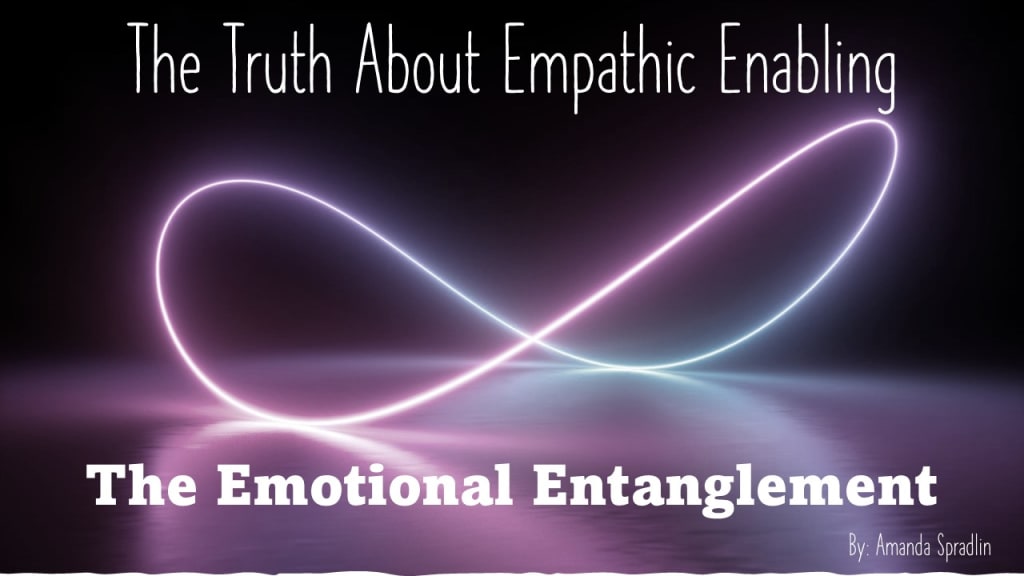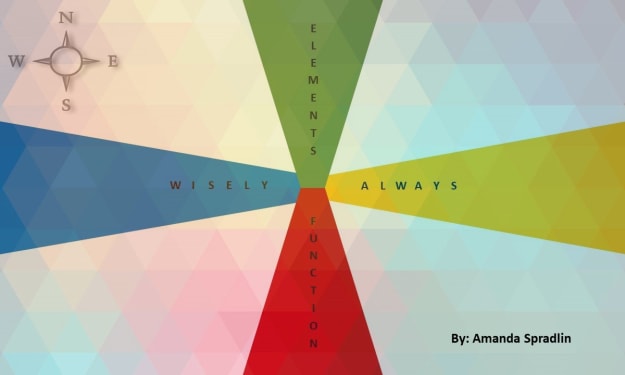The Truth About Empathic Enabling
The emotional entanglement

By: Amanda Spradlin
12/31/2021
Yes, you read the title right. We empaths sure have a way of breaking things down for everyone else. We can discuss their confusing behaviors. We can explore their level of emotional maturity, but very rarely are we willing to admit our own role of participation. We enable and sometimes even encourage others to continue choosing things that do not serve them, or us, by over-extending our compassion. Sometimes, the best help we can give someone, is none at all, because that is the only way that they will have an opportunity to figure things out for themselves.
Now, I have a very unique perspective on this subject from my own experience. Obviously, I identify as an empath. In earning my master’s degree in Management and Leadership and certificates in occult sciences, I was forced to face myself and my behaviors, characteristics, and traits. Who was I? Why am I the way that I am? How does the world work? How do our interactions impact things? What the hell am I doing? Through various assessments, I was found to be an INFJ-A personality type with an Assertive communication style.
Most empaths will relate to these next statements. We are deep thinkers with active imaginations. Our principles guide our actions and our values impact our feelings. When someone carries out a wrongdoing to us, we immediately try to understand what made them act that way. We begin by deep thinking and follow it up by imagining different scenarios of possibility to determine the root cause. Was it something we did? Now, let me explain further. That is a very enthralling way for an empath to create an excuse.
I think, therefore I feel, and so I act, and therein lies the problem. I think too fast, I feel too much, and I do whatever I can to try to regain balance in the connection. In turn, this let’s whomever I’m dealing with off the hook, essentially, because I’ve already figured it out for the both of us. If I’m making changes to correct the issue than what do they need to do? Nothing. Then, what do they learn? Nothing. What is the end result? The empath in me has just enabled a situation to repeat.
For example, if an empath is dealing with someone who doesn’t like confrontation and is flighty, they will most likely be left hanging amidst any type of disagreement. When we empaths get ghosted, we think deeply trying to understand why the person ghosted us. Maybe, we don’t know they are flighty. Maybe, we don’t know they have problems with confrontation. Perhaps, they really did have something urgent come up. Perhaps, they fell off a cliff… Okay, so hopefully not the last one, but you get the point. Next, we start imagining and brainstorming other ways we could have approached the situation for a better outcome, so that we can try something different the next time around.
However, when the next time around actually does come around, and we try our preconceived alternative approach and the same ghosting quick exit happens, we’re left wondering, once again, WTF? So, we go through the same process, step-by-step, all over again. This just keeps leaving us emotionally exhausted. We give, and give, and give, until our hearts are running on empty and there is nothing left in our thought tank to give a flying you-know-what anymore about anything. Our dynamics of human interaction get damaged, and we turn inward to heal ourselves from the hurt.
Empaths also tend to give multiple chances. Personally, I have a 3 strike rule for very good reason. Everyone is human. We make mistakes. We live, and we learn. The world is no different than a boarding school for the soul. The first strike could be a simple misunderstanding. The second could be an accident, not intentional. If there is a third time though, then you have to start acknowledging it as a pattern and remove yourself from the cycle because it will only continue. Empaths are the most compassionate and generous individuals but when you reach a tipping point there becomes a need for energetic conservation. You can’t encourage change by enabling something to remain the same.
This is the truth about empathic enabling. We like to see the best in people and all of their potential. We try to be supportive, understanding, attentive, and all of that good high vibe stuff, but if they aren’t ready to step into themselves and address their own behaviors to meet us halfway, then we can’t help them. All we can do is enforce our own boundaries.
About the Creator
Amanda Spradlin
Amanda Spradlin is the founder of Coincidental Chaos. She writes with the passion of a questionable mind. Any donations are appreciated!






Comments
There are no comments for this story
Be the first to respond and start the conversation.